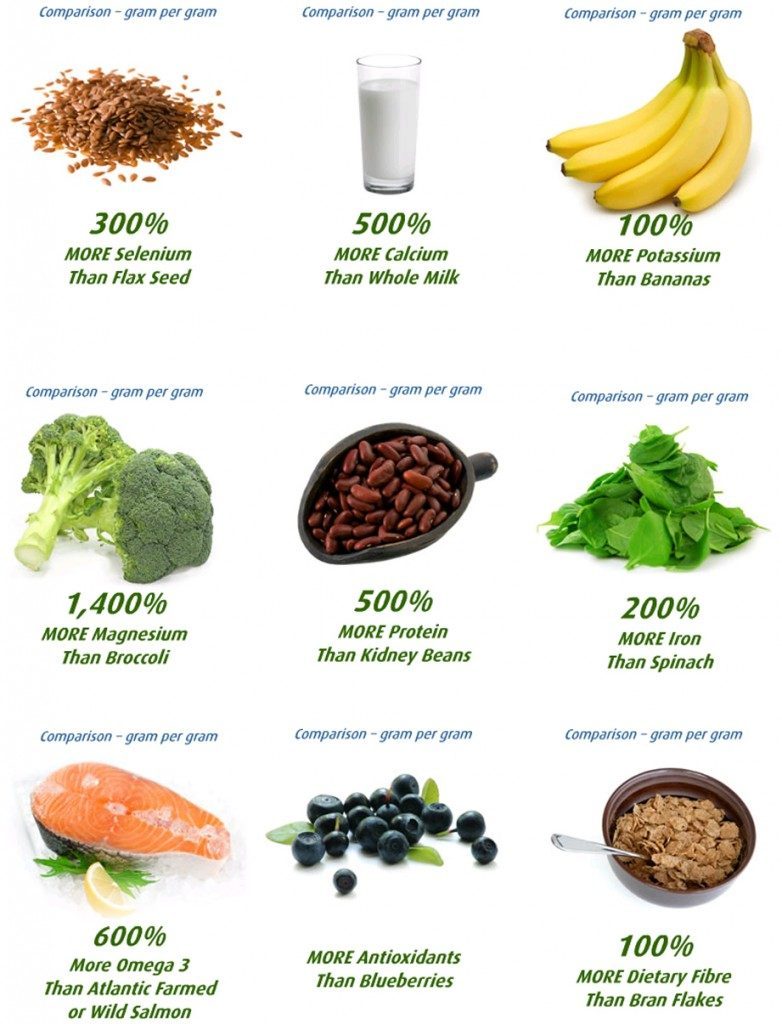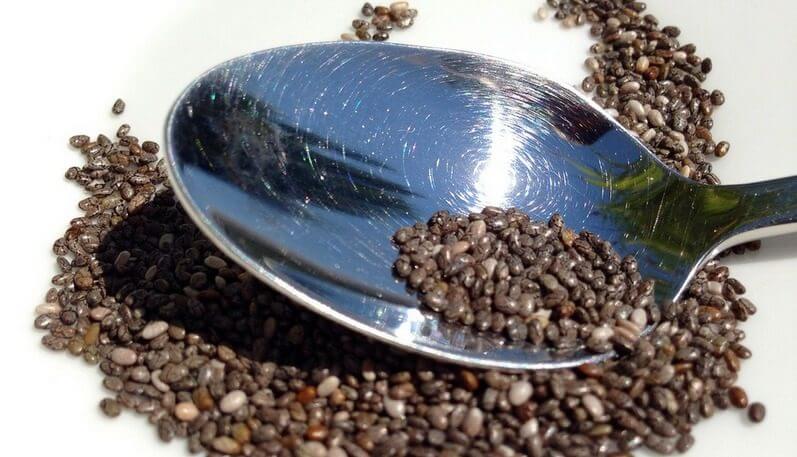Chia seed’s (Salvia hispanica) popularity is growing as the many health benefits of chia seeds become more known. Doing research for this article helped me to expand my understanding of how good chia seeds really are for us, and subsequently I now ‘prescribe’ chia seeds to most of my clients!
So if you’re not familiar with them at present, reading this post will help you to appreciate their importance and benefits for overall health and wellbeing.
Chia seed, a member of the mint family, is native to Central America and has been used there for over 3,000 years – it was one of the most important crops of the Aztecs. Remarkably, chia seeds have the highest amount of plant omega 3 fatty acids (as alpha-linolenic acid) of any known plant.
In addition it also contains significant amounts of protein, fibre (both soluble and insoluble) and antioxidants, making it a great, nutritionally dense and easy to get energy source.
Due to its high fibre content (more than 35%), chia seed has the incredible ability to absorb 8-10 times its weight in water making it an excellent source of gut lubrication and internal hydration. Chia’s fibre forms a gel that slows the absorption of sugar into the bloodstream, binds the toxins in the digestive tract and helps eliminate waste.
Research confirms that omega 3 fatty acids and fibre have positive health benefits for heart health, lowering cholesterol and blood pressure. Omega 3 fatty acids and antioxidants have been shown to help reduce inflammation, increase immunity and slow down aging.
When we consume chia seeds, the body utilises those components of the seeds that are most beneficial for each person. Some people who consume chia seeds regularly experience reduced cholesterol levels, others have less joint pain, lose weight (due to the fibre action promoting satiety and thus reducing appetite), have increased energy, more stamina and better moods.
As with any food, the effect it will have on the body will vary from small changes to more significant ones, depending on a person.
The importance of omega 3 fatty acids in the diet has become an important and growing health consideration. In addition to omega 3 playing an important role in the brain function, normal growth and development, the seeds also help in the prevention of cancer and cardiovascular disease.
One 15g serving of chia provides more than 3g of omega 3 (as alpha-linolenic acid) and 1g of omega 6 (linoleic acid) in a perfectly balanced 3:1 ratio, making it the richest, unprocessed and whole food source of omega 3 fatty acids.
Importantly, omega 6 and omega 3 are the essential fatty acids for humans meaning they cannot be synthesised in the body, and have to be obtained from foods. They are precursors of powerful hormones that affect many biological processes, help maintain a healthy skin and hair, are involved in cholesterol metabolism and are vital for brain health, among others.
As opposed to other seeds and grains, chia seeds can be stored for long periods of time as they have very high levels of antioxidants and hence they maintain a 99% sprout rate and have a shelf life of up to five years at room temperature.
Furthermore, chia seeds are rich in calcium, potassium, magnesium, iron, zinc; many trace minerals and biologically complete protein, making them the perfect food.
Chia seed comparison chart

Photo courtesy of Collective Evolution
Chia seeds – summary of benefits
- Highly nutritious and nutrient dense food, the seeds enhance energy levels and extend endurance
- One of the highest overall antioxidant containing foods — the seeds have more antioxidants than blueberries or prunes
- Aid in increasing nutrient absorption and utilisation by the body
- Act as a digestive aid facilitating better assimilation of food
- Increase satiety and fullness thus helping with hunger management and weight loss
- Encourage healthy, gentle and regular bowel movements, help with constipation
- Prevent dehydration and support electrolyte balance
- The fibre present in chia seeds slows digestion and the release of glucose into the bloodstream, helping diabetics and people with insulin resistance maintain appropriate blood sugar levels
- Heart and cardiovascular system benefits are due to the high content of omega 3 fatty acids and antioxidants
- High protein content – chia seeds are an excellent source of plant-based protein. In particular, they are a valuable source of protein for vegetarians
- They are gluten free and are recommended for people suffering from celiac disease and non-celiac gluten sensitivity (NCGS)
- Improve condition of skin and hair – because of high protein and omega 3 content
- Contain significant amounts of flavonoid quercetin that reduces inflammation anywhere in the body
- Rich in bioavailable minerals including calcium, phosphorous, zinc, copper and manganese
Chia seeds are versatile, easy to use and have a subtle, nut-like flavour that doesn’t interfere with other flavours. They don’t need to be ground but are eaten on their own or mixed into foods such as porridge, salads, yoghurt or added to smoothies.
Before consuming them, it’s best to soak chia seeds in water for 10-20 minutes (or overnight) until they increase in volume and the gel is formed.
Caution: when commencing eating chia seeds, start slowly with 1 teaspoon in the morning for a few days and if you don’t experience any gut symptoms then have another teaspoon in the afternoon. Because of the high fibre content, always have chia with a big glass of water to prevent gut upsets. Keep well hydrated all the time when eating chia. Consuming too much of the seeds to start with can cause stomach cramps, diarrhoea or gas and flatulence. Gradually increase the amount to the portion optimal for you.
Lastly, chia seeds are also an excellent food for animals such as cats and dogs. The omega-3 in chia is great for your pet’s skin and fur and will make the coat soft and shiny. Just add chia seeds directly to the regular food for dogs, cats, birds, horses, etc.
Good health and blessings
![]()
Joanna Sochan
Holistic Health and Lifestyle Therapist
Natural and Lifestyle Solutions for Chronic Diseases
Check out other posts here:
- Top 5 Bliss Balls Recipes: gluten free, high protein, no dates
- Eat this – Kiwi fruit
- Cookie decoration ideas – pictures
- Bee pollen for weight loss – a great but totally overlooked strategy!
- Eat this – Cauliflower
Disclaimer: The above material is for informational and/or educational purposes only. It should not be used to self-diagnose and it is not a substitute for a medical advice, diagnosis, treatment, prescription or recommendation. All viewers of this content, especially those taking prescription or over-the-counter medications, should not make any changes in their health regimen or diet before first consulting a doctor or other qualified health provider with any questions they may have regarding a medical condition or their particular circumstances.
 Joanna Sochan is a Natural Therapist and founder of Naturimedica Holistic Wellcare. She has a passion for helping clients transform their lives by becoming healthy and well naturally. Joanna has 10+ years experience in clinical practice and has special interest in solving complex cases, functional lab testing, gut health, sleep, fatigue and chronic pain. She guides clients through her tailored programs and eCourses as well as helping them individually (mostly online) Australia-wide. View full bio.
Joanna Sochan is a Natural Therapist and founder of Naturimedica Holistic Wellcare. She has a passion for helping clients transform their lives by becoming healthy and well naturally. Joanna has 10+ years experience in clinical practice and has special interest in solving complex cases, functional lab testing, gut health, sleep, fatigue and chronic pain. She guides clients through her tailored programs and eCourses as well as helping them individually (mostly online) Australia-wide. View full bio.
 Print This Post
Print This Post 

Leave A Comment